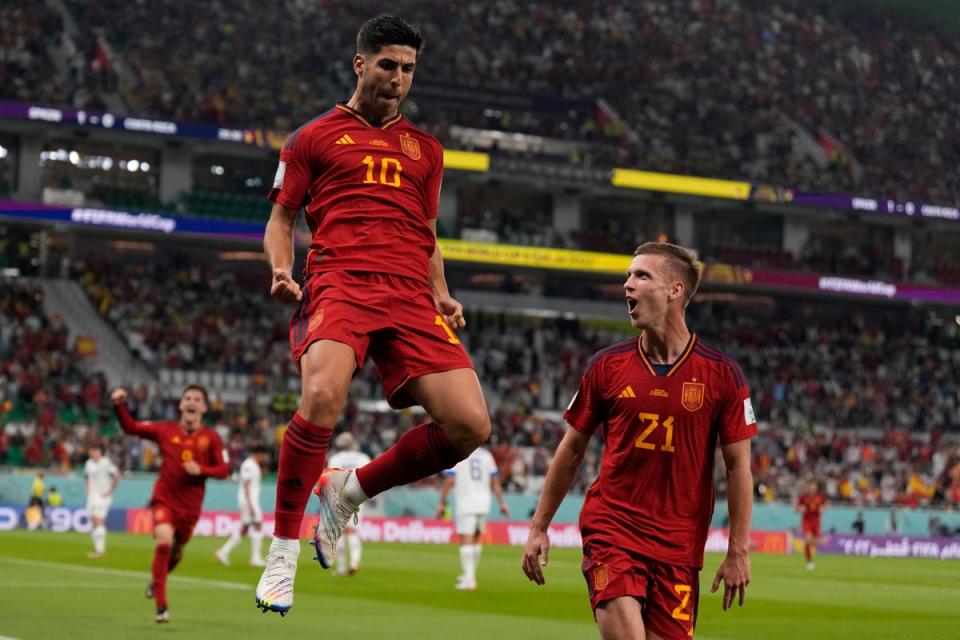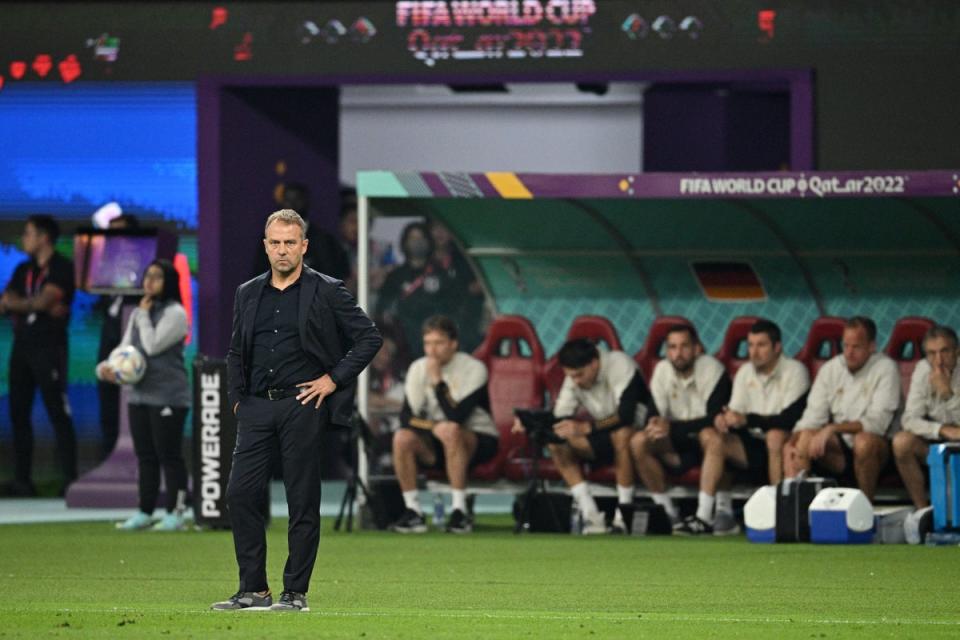Hansi Flick and Luis Enrique at heart of battle of World Cup heavyweights
As Luis Enrique was talking about how sex the night before games is fine, but an “orgy” is “not ideal”, Hansi Flick - well - was seeming metaphorically impotent. It was Ilkay Gundogan who had been the strongest voice in a crisis meeting after the defeat to Japan, where Germany’s somewhat unlucky display started to come apart as Flick desperately threw on more forwards. The breakthrough didn’t come with either Niclas Fullkrug or Youssoufa Moukoko.
These weren’t exactly the most inspired or imaginative decisions.
Flick and his staff have since been scrutinising the Spanish match against Costa Rica, looking for different ways to get at them, but also the gaps in their own team. Thilo Kehrer is expected to come in for the struggling Niklas Sule.
More insight than that will be required, and not just because of how good Spain were in that 7-0, or how it is a rare group-stage clash between heavyweights that could slam Germany out.
It is also a meeting between the only two coaches at this World Cup to have recent major club success. And what success. The two are responsible for the last two trebles in the Champions League. Luis Enrique won with Barcelona in 2015, Flick with Bayern Munich in 2020.
That matters because it points to their experience and effectiveness at the elite level of the game, something that most managers at this World Cup do not have.
It is not an exaggeration to say it might even be a meeting between the two best coaches at this tournament. They have imposed similar ideas of football on their teams, who have become archetypes of the modern pressing-possession approach that has come to dominate the international game as much as the club game.
It is there, however, where the similarities begin to cease. The differences could define this fixture.
While the two may have comparable tactical ideas, they have built their teams in completely different ways. Those ways echo their club success, too.
Flick has mostly sought to reinforce what Germany have, but Luis Enrique has completely ripped Spain up.
The latter felt that the entire ideology of Spanish football was in danger of going stale and being passed by, so became intent on introducing a new intensity. It was something he was already conscious of at Barcelona, and the move to have Ivan Rakitic playing more direct balls to that famous MSN forward line. That decision involved discarding some real legends, who were no longer at their sharpest, such as Sergio Ramos and David De Gea.
There’s a double motivation to that, too. Younger plays will run much more for that intense style, but are also much more willing to follow instruction. That is crucial in a Spanish team as drilled as this.
It also points to another element shaping this game. While Spain have some real world-class talent, most notably Pedri and Gavi, you wouldn’t yet say it has true “stars” as players.
The dominant figure is Luis Enrique himself. He is so involved that he insisted on the change to red shorts against Costa Rica. It is something that has most been showcased in one of his many novel moves, which is his nightly ‘Twitch’ video. It was here he had the line about the orgies and what might happen to Ferran Torres if he reveals he is to be dad with Luis Enrique’s daughter, but also where he offers real insights about his approach.
It also speaks to his willingness to be unorthodox and try different things. That initially rubbed some people up the wrong way, including some player entourages, and it can be the sort of thing that becomes totally dependent on results.
It consequently looks like a masterstroke after a 7-0, and has made Luis Enrique even more endearing.
The 52-year-old had previously been seen as a divisive and often antagonistic figure, that is maybe articulated in how willing he was to go from Real Madrid to Barcelona as a player. He can be spiky, especially with media. The tragedy of his daughter’s illness and passing, to go with the manner Luis Enrique spoke about it, naturally brought a lot of sympathy. He became a hero, which was only emboldened when he took a young team to the Euro 2020 semi-final in a newly adventurous fashion.

It is for all of these reasons that he now has a very united group. There is none of the usual angst or tension around a Spanish squad, as could be seen with Alvaro Morata’s childlike joy on talking about his first World Cup goal.
It is not like that with Germany right now. There is growing talk of a split in the camp and “a lack of trust”. The squad is described as being “in shock”.
A further irony to all of this is that Flick is generally seen as a much more facilitative figure than Luis Enrique. He is the nice cop. You would never hear the Bundestrainer deliver such rollockings. That is mostly left to old-school Bayern coach Hermann Gerland, but is also why Gundogan has had to speak out so much.
Right now, it feels like Germany could have done with much more abrasiveness - more of Luis Enrique’s curtness.
There has been no clean break from the 2014 team, no new era. Flick himself worked under Jogi Loew. The team, according to one source, “remains an uncomfortable combination of old and new”.
It has meant that, although you can generally see a sharper idea of football - and especially counter-pressing - there are still residual issues from Loew’s time.
The response to conceding an equaliser to Japan is being described as “all of the old problems coming back up”. Germany seemed out of ideas, as if the anxiety of the 2018 team was gripping them again.
The circumstances also exposed deeper flaws, such as the lack of top-class full-backs and centre-halves. There’s another irony in how it has brought new questions about the exclusion of Mats Hummels, especially since that was a decision based on team dynamics. The Borussia Dortmund defender increasingly rubbed people up the wrong way.
It hasn’t exactly been right since. Germany need the elixir of a big-game result more than ever.
Flick needs to banish the growing argument that the reason he had such success at Bayern - and why he might now not be right for the national team - was because he was just the right man at the right time; that he only restored Bayern’s existing principles. He now needs a response.

With talents like Jamal Musiala and Flick’s general idea of football, however, that just can’t be ruled out. You still can’t write off the Germans.
That’s because, on paper, this remains a very even contest between heavyweights. The stakes have only been heightened.
That may sharpen Germany. It may bring more out of Spain, as we’ve seen in previous tournament games against big opposition. There’s a strong argument the best performance under Luis Enrique was against Italy in the Euro 2020 semi-final defeat. Germany’s under Flick was probably against England in Munich in June.
That was still a 1-1 draw, and Germany need more on Sunday. They need something extra, the type of effect that is required to win the Champions League.
That is why these managers have these jobs. That’s what only elevates this match further.

